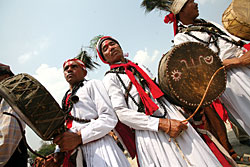 KIRAN PANDAY |
Malaise oozed through my pores as I lay bedridden with a cold and a persistent fever. But my housemates were not going to let me slip away. Home-made remedies kept cropping up - prayers, hot ginger water with honey, steam inhalation, a cloth around my head, the works! What I then realised, after entertaining them and subsequently recovering, was this - you are not really Nepali if you are not a self-prescribing doctor. Which made me wonder...how powerful is this 'jhankri science'?
Jhankris and other practitioners have been an integral part of Nepali society, even if the practice is not as widespread in our cities as it is in the rural areas. They are believed to possess supernatural powers and the knowledge of mastering spirits. Shamans take on the role of priests and doctors to heal patients and ward off evil spirits. Matas are a relatively new concept: these are individuals who periodically become possessed by a god, and they diagnose problems, suggest remedies, and predict the future. Despite the advent of modern medicine, some still find solace in having a jhankri slaughter a goat and beat them with a broom to rid them of spirits!
Intrigued by the idea of a mata who could possibly predict my future and save me a lot of time deciding on a career or whom I would marry, I made my way to Baluwatar last week. When I was admitted, I saw before me a young woman with eyes closed, apparently in a trance. Right off the bat she asked me whether I had a younger sister. I was impressed but was it just a good guess? Curious to find out more, I told her that I had a nagging leg ache and poor eyesight. She advised me to make offerings to Bangalamukhi and pray for a speedy recovery. I asked her about my future, and she said that I would live close to my parents and settle down happily. Pleased enough, I made my obeisances and left - though unsure where I should go next, the temple or the pharmacist.
A couple of days later, my grand-aunt narrated to me a bizarre incident. She'd been on her way back from the Budhanilkantha market, and was drawn to a large crowd. A man had fallen to the ground and was writhing, as if in an epileptic fit. People tried sprinkling water on his face to resuscitate him, but it only aggravated his convulsions. Then through the crowds a man came up, promptly removed his shoes and began urging the sick man to partake of the fumes of his socks. Miraculously, the man regained consciousness and thanked him profusely for his kind gesture. A strange genre of smelling salts!
I have encountered a fair number of superstitious people in Nepal, including myself. Some blow on their fingers if they happen to touch their necks, refrain from crossing the road if a black cat crosses their path, and abstain from stepping on brooms. Psychologists maintain that superstition is the result of 'adventitious reinforcement'.
B.F. Skinner demonstrated that you can create superstitious behaviour in animals, too. When an animal is placed in a box with a device to automatically dispense food every five minutes, the animal will typically develop superstitious behaviour. For instance, if the animal happens to lift up its right foot just as the food is dispensed, it will then repeat this behaviour, which will be intermittently reinforced. Soon enough, its superstitious behaviour will become well established, just like in humans. If politicians believe that feigning illness can work in their favour when the going gets tough, perhaps 'jhankri science' can beat out this superstition so we can get on with building New Nepal?


